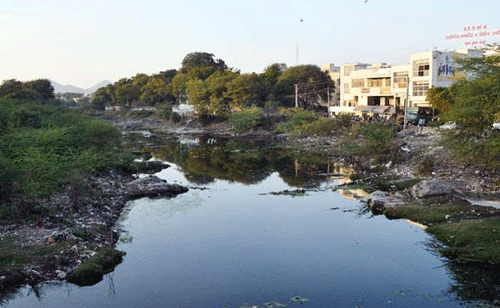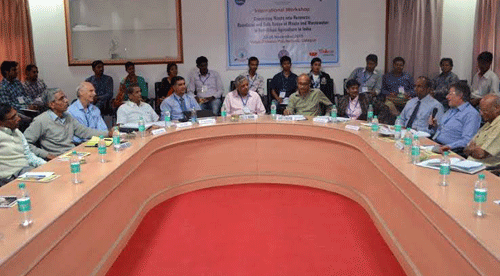Untreated Sewage threat to Health & Environment
Out of 40,000 mega litres of sewage produced everyday in India, only 20-30% is treated. The untreated sewage is commonly discharged into rivers and streams which is one of the main reasons for surface water pollution.

Out of 40,000 mega liters of sewage produced everyday in India, only 20-30% is treated. The untreated sewage is commonly discharged into rivers and streams which is one of the main reasons for surface water pollution.
The above mentioned observations were discussed during a four-day Indo-Australian workshop which was sponsored by Crawford Fund of Australia. The delegates discussed the opportunities and challenges of reuse of waste water. They mentioned that the untreated sewage is threatening to the health and environment.
Experts and practitioners from India and Australia participated in this event which was hosted by Vidya Bhawan and MPUAT in collaboration with Wolkem India Ltd, CSIRO Australia and Western Sydney University.
According to Anil Mehta environmentalist, “The workshop called for concrete actions to deal with the problem of untreated sewage, such as in Ahar River. Rivers in India are dying or dead or have been converted to drains of untreated sewerage. Rivers Yamuna and Ahar (Udaipur) are living examples.”

Dr. Rai Kookana, a scientist from CSIRO Australia and co-convenor of the workshop presented results from a study on Ahar River which receives city’s untreated sewage, highlighting the detection of high levels of some antibiotics and other toxics in the river water. This is of huge concern as the antibiotics cause antibiotic resistance development in pathogenic bacteria and threaten to take humans back to the dark ages-the era prior to the invention of antibiotics, said Kookana.
While waste water being rich source of carbon and nutrient can be a good resource for irrigation in peri-urban agriculture, the untreated sewage causes pathogen and heavy metal contamination of vegetables and salad produced. Farmers and their families who work with untreated waste water are exposed to high risk of disease, said Dr. Chris Derry, an expert in public health.
Surveys of septic tanks in Udaipur by VidyaBhawan and Centre for Policy Research (CPR) revealed that they mostly discharge to open drains and produce poor quality effluent that needs further treatment before release to rivers or for reuse.
Few have leach fields and these would pollute groundwater if used for effluent disposal. The workshop findings were shared with the city administrators on the final day of the workshop, who acknowledged the opportunity and the interactions.
Source: UdaipurKiran.com
To join us on Facebook Click Here and Subscribe to UdaipurTimes Broadcast channels on GoogleNews | Telegram | Signal


